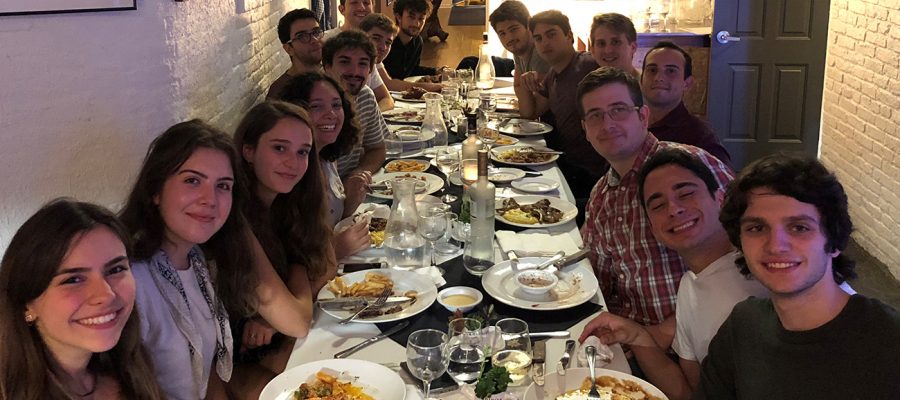Bugrahan Cigdemoglu graduated from Johns Hopkins in 2017 with his bachelor’s degree in biomedical engineering and computer science. Now working as a software engineer in Silicon Valley, Cigdemoglu offers career advice for current students looking to prepare for their future.
Bugrahan Cigdemoglu WSE ’17, had two major goals before coming to Johns Hopkins University–work in Silicon Valley and achieve immortality. He accomplished his first goal when he was able to turn his summer internship at DNAnexus, a biomedical informatics and data management company in Mountain View, into a full-time offer right before his senior year. He’s currently a software engineer for the company.
“The skillset that I gained from Hopkins got me a job in Silicon Valley,” he says. “Being a [Johns] Hopkins graduate, you’re ahead of some people. It developed my character in a way that allowed me to succeed in the United States, which is very competitive for international students.” Now, Bugrahan is recruiting for DNAnexus at Johns Hopkins, where he loves meeting with younger students and finding great candidates.
How I Got my Job at DNAnexus
I got my DNAnexus internship through the Career Fair at Hopkins. I handed my resume to Sean King, WSE ’14, who is now my manager. Michael Beer, associate professor of biomedical engineering, told me it was a growing company in a good industry. He gave me perspective of where the genomics industry was going, and now I see that opportunities are going to grow exponentially. At the end of my internship I asked Sean to give me a recommendation as an employee, which led to a full-time job offer.
What My Job is Like
I use skills from both my majors. My education in biomedical engineering helps me understand the company’s vision and product, and computer science helps me develop the product. DNAnexus is a cloud-based biomedical informatics and data management platform. Companies upload multi-omic (genomes, epigenomes, etc.) and clinical information and run analyses. As a back-end software engineer, I make sure the platform is secure, fast, clinically compliant, and that we provide new features for customers pursuing genomic-based approaches to health. The majority of work done with our platform goes into managing a global and collaborative network to accelerate science and discovery across a spectrum of industries: pharmaceutical, bioagricultural, clinical diagnostics, medical centers, and government.
What Makes my Work Rewarding
Most Mondays it’s as if the industry has evolved completely. I love that! In the coding world, you build upon code that other people wrote on a daily basis. It grows exponentially and you have to keep up with it. Once, a customer requested a feature to do a test that couldn’t be done on any other genomic analysis platform. When we first created our initial object to solve their problem, I wrote the I.D. number on a sticker, and I’ve kept it on my desk. Knowing that using that object, DNAnexus will provide access to massive genomic datasets that will help cure incurable diseases or help babies be born healthy, was a rewarding feeling.
What JHU students Can Do to Prepare for Internships and Jobs
- Reach out to alumni. Use social media platforms to job search, and get in touch with people who are currently working at companies. That’s how I got my internship, and students reach out to me, too. Cathy Jancuk, the biomedical engineering undergraduate program manager, is a great resource for students to get in touch with alumni.
- Follow up with the alumni. The follow-up shows who is really passionate about the job, and who is just applying everywhere. Even after I got my full-time offer, I did my best to keep up the relationship with my manager.
- Pick one club and make an impact. Rather than listing 20 clubs, it’s a good idea to have one solid experience with one club–leadership, accounting, or some evident impact on the club.
- Use your club to make connections. The number one thing I did when looking for internships was reaching out to alumni of the Turkish Students Association. Now I’m consulting for friends and current students, and introducing them to people who might be able to answer their questions about a specific company.
- Make time to form better bonds with professors. Eventually you will need to consult them on their research and their expertise in their fields.
How to Make the Most of Internships
Be a true team member
Learn to work as a team member. We always emphasize teamwork at Hopkins, but it’s hard to understand its significance while doing short-term assignments. Once you become a member of the team in an internship, observe what other people are doing in the team and see how each person contributes to the team, how you can fit in, and contribute to it. For example, I am on the social side, so I like to keep the team motivated around the goal.
Work specifically on gaining skills
Learn as many tools as possible. Ask questions about what the tools do and what the tech does. It’s a great way to get a head start. Your impact becomes more important than skills once you become full-time, but as an intern, focus on developing your skillset.
What type of JHU students stand out to you as a recruiter?
At the Fall Career Fair this year, it was nonstop talking to amazing candidates from Hopkins. The students who were prepared for the fair, who knew about the company, performed much better. The candidates we’re interviewing now already knew about the company and what skills they would need, even in a vague way. One student has already used the DNAnexus for 5-10 minutes. I knew right away that student would get an interview. That student had also attended a Pre-Fair Prepare session from the Career Center. Those students knew what to do—their resumes were well organized.
This article first appeared on the Johns Hopkins Student Affairs website.

